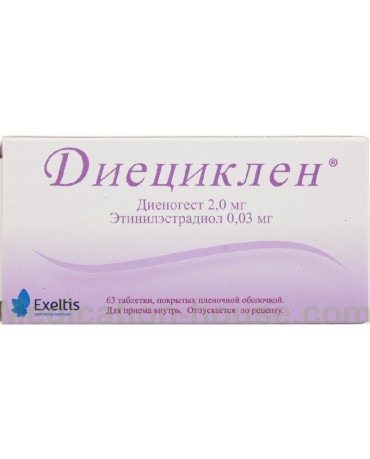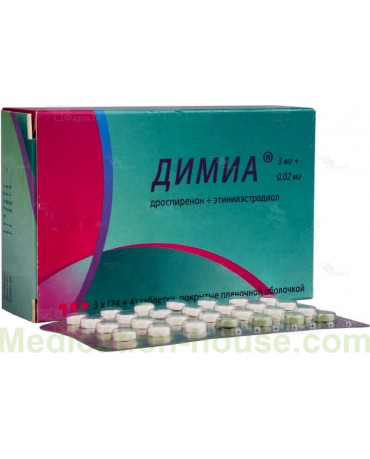Instruction for Jeanine
You can buy Jeanine here
Jeanine is a low-dose, monophasic oral contraceptive with antiandrogenic properties.
Release form and composition
Jeanine's dosage form - dragees: smooth, white (21 pcs. In blisters, in a cardboard box 1 or 3 blisters).
Content of active substances in 1 tablet:
Dienogest - 2 mg;
Ethinylestradiol - 0.03 mg.
Auxiliary components: potato starch, lactose monohydrate, gelatin, magnesium stearate, talc.
Shell composition: calcium carbonate, sucrose, macrogol 35,000, dextrose, polyvidone K25, carnauba wax, titanium dioxide (E171).
Pharmacodynamics
Jeanine is a monophasic low-dose combined estrogen-gestagenic oral contraceptive drug. Its contraceptive action is carried out through complementary mechanisms, the most important of which are the suppression of ovulation and the increase in the viscosity of cervical mucus, which ensures impermeability to sperm.
The use of Jeanine in compliance with the recommended dosage regimen provides an indicator of the Pearl index (the number of pregnancies per 100 women who take this contraceptive throughout the year) less than one. Skipping pills or improper use can increase this value.
Dienogest is a gestagenic component in Jeanine's composition, has clinically proven antiandrogenic activity and improves the lipid profile of blood, increasing the amount of HDL (high density lipoproteins) in its composition.
Taking combined oral contraceptives regulates the menstrual cycle, inhibits the intensity and duration of menstrual bleeding, thereby reducing the risk of IDA (iron deficiency anemia), relieves pain, and also reduces the risk of endometrial and ovarian cancer.
Pharmacokinetics
Pharmacokinetic characteristics of dienogest:
absorption: after oral administration, the substance is rapidly and completely absorbed from the gastrointestinal tract. The indicator of the maximum concentration (Cmax) - 51 ng / ml, is achieved 2.5 hours after taking the pills; bioavailability is ~ 96%;
distribution: by binding to blood proteins (up to 90% nonspecifically bound to serum albumin), dienogest does not bind to SHBG (sex steroid binding globulin) and CGG (corticoid binding globulin). Up to 10% of the substance is in the blood serum in free form. Induction of SHBG synthesis by ethinyl estradiol does not affect the binding of dienogest to serum protein, and serum SHBG levels do not affect the pharmacokinetics of dienogest. Daily intake of pills increases the serum concentration of dienogest by about 1.5 times;
metabolism; dienogest is almost completely metabolized, its clearance after taking a single dose is approximately 3.6 l / h;
excretion: the half-life (T1 / 2) is ~ 8.5-10.8 hours; a small part is excreted unchanged through the kidneys, metabolites are excreted in bile and urine in a ratio of approximately 1 to 3, T1 / 2 of metabolites is 14.4 hours.
Pharmacokinetic characteristics of ethinyl estradiol:
absorption: after oral administration, the hormone is rapidly and completely absorbed from the gastrointestinal tract. The indicator of the maximum concentration (Cmax) - 67 pg / ml, is reached 1.5–4 hours after taking the pills; during absorption and in the course of presystemic elimination (the effect of the first passage through the liver) as a result of metabolic transformations of ethinyl estradiol, its bioavailability index is ~ 44%;
distribution: almost completely (up to 98%) ethinylestradiol nonspecifically binds to serum albumin, the hormone induces the synthesis of SHBG. Its apparent volume of distribution (Vd) varies from 2.8 to 8.6 l / kg. Ethinyl estradiol reaches steady-state equilibrium blood concentration (Css) in the second half of the therapeutic cycle;
metabolism: during presystemic conjugation in the mucous membrane of the small intestine and in the liver, ethinyl estradiol undergoes aromatic hydroxylation. The plasma clearance rate is 2.3–7 ml / min / kg;
excretion: a decrease in the serum level of ethinyl estradiol is divided into two stages: the first stage - T1 / 2 is ~ 1 hour, the second stage - the T1 / 2 indicator is from 10 to 20 hours.The hormone is not excreted from the body unchanged, its metabolites are excreted in the bile and urine in a ratio of about 6 to 4, T1 / 2 of metabolites is 24 hours.
Indications for use
Jeanine's use is indicated for women as oral contraception.
Contraindications
Diabetes mellitus with vascular complications;
Venous and arterial thrombosis (including pulmonary embolism), deep vein thrombosis, cerebrovascular disorders, myocardial infarction (history or current);
Diseases of the coronary arteries of the heart or cerebral vessels, complicated lesions of the valvular apparatus of the heart, uncontrolled arterial hypertension, atrial fibrillation, smoking over the age of 35, serious surgery with prolonged immobilization and other severe risk factors for arterial or venous thrombosis;
Angina pectoris, transient ischemic attacks and other conditions preceding thrombosis (history or present);
Severe liver disease and liver failure (before normalization of liver function tests);
Pancreatitis with severe hypertriglyceridemia (history or current);
Benign or malignant liver tumor (history or present);
Migraine with focal neurological symptoms (history or present);
Vaginal bleeding of unknown etiology;
Malignant hormone-dependent diseases of the mammary glands or genitals (diagnosed or suspected of having them);
The period of pregnancy or suspicion of it;
Breastfeeding period;
Hypersensitivity to the components of the drug.
If any of the listed conditions appears against the background of Jeanine's use, the drug should be discontinued immediately.
According to the instructions, Jeanine with caution, only after assessing the expected benefits and potential risks from taking, should be taken for the following diseases and conditions:
Liver disease;
Presence of risk factors for the development of thrombosis and thromboembolism: obesity, smoking, dyslipoproteinemia, migraine, arterial hypertension, heart valve defects, extensive trauma, serious surgical interventions, prolonged immobilization, hereditary predisposition to thrombosis, the presence of a disorder in one of the closest relatives at a young age cerebral circulation or myocardial infarction;
Hereditary angioedema;
Diabetes mellitus, hemolytic uremic syndrome, Crohn's disease, systemic lupus erythematosus, ulcerative colitis, sickle cell anemia, phlebitis of superficial veins;
Hypertriglyceridemia;
Postpartum period;
Cholestasis, jaundice, gallbladder disease, porphyria, Sydenham's chorea, otosclerosis with hearing impairment, herpes of pregnant women and other pathologies, aggravated or arising against the background of previous hormonal contraception or during pregnancy.
Instructions for use of Jeanine: method and dosage
Dragee Jeanine is taken orally with a little water.
The procedure for taking is indicated on the package, the dosage of the drug is 1 tablet per day, always at the same time, for 21 days. Then, during the seven-day break, menstrual-like withdrawal bleeding takes place, which can begin 2-3 days after taking the last tablet and continue until the next package is used.
In the absence of hormonal contraception in the previous month, you should start taking Jeanine on the 1st day of menstrual bleeding (cycle). If the reception is started on the 2-5th day of the cycle, you must use barrier contraception for the first 7 days after you start taking the pills from the first package.
When switching from combined oral contraceptives, Jeanine begins to take the next day after taking the last tablet with the active substance of the previous drug (for a calendar package for 28 tablets) and no later than the next day after the usual 7-day break (for drugs containing 21 tablets).
When switching from a transdermal patch or vaginal ring, it is advisable to start taking Jeanine on the day of their removal, but not later than the day of the supposed new sticking of the patch or the introduction of the ring.
When switching from an injectable contraceptive, pills are taken on the day of the intended next injection; from contraceptives consisting only of gestagens ("mini-drank") - any day, without interruption; from an implant or intrauterine contraceptive - on the day of their removal. In each of these cases, in the first 7 days of taking pills, it is necessary to additionally use a barrier method of contraception.
Reception of Jeanine after an abortion in the first trimester of pregnancy can be started immediately, without additional contraception.
After an abortion in the second trimester of pregnancy or childbirth, Jeanine is recommended to be used only from 21 to 28 days; in case of a later start of taking, additional barrier methods of contraception are required during the first 7 days of taking pills. Women who have had sexual intercourse between an abortion or childbirth and the beginning of taking Jeanine's pills should wait for the first menstrual bleeding or exclude pregnancy.
Jeanine provides reliable contraceptive protection when taken continuously at a specified time. The effect of the drug does not decrease if the delay is less than 12 hours, the missed pills should be taken as soon as they are remembered, and the next pills should be taken at the usual time.
It should also be borne in mind that a break in taking Jeanine should never exceed more than 7 days, and for normal suppression of the hypothalamic-pituitary-ovarian system, continuous intake of pills for 7 days is required.
If the delay in admission is more than 12 hours (that is, more than 36 hours from the moment of taking the last active pills) in the first week of using Jeanine, the missed pills must be taken as soon as possible, even if you need to take two pills at the same time. The next tablet is taken at the scheduled time, and over the next 7 days, a barrier method of contraception should be used.
If a woman had sexual intercourse in the next week before skipping the pills, then the risk of pregnancy increases. The likelihood of pregnancy depends on the number of missed pills and how close it happened to the expected interruption in admission.
If the delay is more than 12 hours in the second week of Jeanine's use, the missed pills must be taken as soon as possible, even if you need to take two pills at the same time, and the next pills - according to the scheme at the usual time. Women who take the drug regularly for 7 days before the first missed pills do not need additional contraceptive measures. Otherwise, if more than two pills are missed, barrier methods of contraception must be used over the next 7 days.
If a delay of more than 12 hours occurred in the third week of taking Jeanine, the likelihood of pregnancy increases due to the upcoming break in taking pills. Women who, before the first missed pills, took all the others correctly, do not need additional methods of contraception. Further application of Jeanine should be carried out according to one of the following options:
You can interrupt the intake from the current package, take a 7-day break, including the day of the pass, and start the intake from the new package. If during the break the woman does not have withdrawal bleeding, it is necessary to exclude the presence of pregnancy;
The second option is used if the woman decides to continue taking from this package. First of all, you should take the missed pills as soon as possible, even if you need to take two pills at the same time, the next pills are taken according to the scheme at the usual time before the end of the package. Without taking a break, you need to start the next pack of Jeanine. Before it ends, menstrual bleeding is unlikely, but breakthrough bleeding or spotting may occur.
If a woman has diarrhea or vomiting during the first 4 hours after taking the pills, the absorption of the active ingredients may be incomplete, therefore additional protective measures should be taken, focusing on the recommendations when skipping pills.
To change the onset of menstruation to another day of the week, it is necessary to shorten the break in taking pills from the nearest package to the desired number of days. The shorter the interval, the greater the risk of no withdrawal bleeding and the presence of spotting spotting and breakthrough bleeding during the period of taking the second package.
In order to delay the onset of menstruation, a woman can continue taking pills from a new package without interrupting the previous one. You can continue taking it as long as the woman wishes, until the end of the pill. While taking the second pack in a row, a woman may experience breakthrough uterine bleeding or spotting. The use of Jeanine from a new package should be resumed after the usual 7 days of interruption.
For children and adolescents, the use of the drug is indicated only after the onset of menarche.
Jeanine should not be taken after menopause.
In women with impaired renal function, the effect of Jeanine has not been specifically studied, therefore, the available information does not imply a change in treatment in such patients.
Side effects
From the side of the nervous system: often - headache; infrequently - migraine, dizziness; rarely - cerebrovascular disorders, ischemic stroke, dystonia;
From the reproductive system and mammary glands: often - engorgement of the mammary glands, pain and / or discomfort in the mammary glands; infrequently - intermenstrual bleeding (including metrorrhagia and vaginal bleeding), profuse withdrawal bleeding (including menorrhagia, hypomenorrhea, amenorrhea and oligomenorrhea), breast edema, enlargement (swelling and fullness) of the size of the mammary glands, dysmenorrhea, ovarian cysts, discharge from vagina or genital tract, pelvic pain; rarely - dysplasia of the cervix, cysts of the mammary glands, cysts of the appendages of the uterus, pain in the region of the appendages of the uterus, menstrual irregularities, dyspareunia, fibrocystic mastopathy, galactorrhea; possibly - discharge from the mammary glands;
From the lymphatic system and blood: rarely - anemia;
From the endocrine system: rarely - virilization;
From the senses: rarely - dizziness, oscillopsia, irritation and / or dryness of the mucous membrane of the eyes, tinnitus, impaired or sudden hearing loss; possibly - intolerance (discomfort when wearing) contact lenses;
From the side of the cardiovascular system: infrequently - arterial hypotension or hypertension; rarely - tachycardia (including increased heart rate), cardiovascular disorders, thrombosis or thromboembolism of the pulmonary artery, thrombophlebitis, orthostatic circulatory dystonia, diastolic hypertension, hot flashes, venous pathology (including varicose veins and pain in the vein);
From the respiratory system: rarely - bronchial asthma, hyperventilation;
From the digestive system: infrequently - pain in the upper and lower abdomen, bloating or discomfort, nausea, vomiting, diarrhea; rarely - dyspepsia, gastritis, enteritis;
From the musculoskeletal system: rarely - myalgia, a feeling of discomfort in bones and muscles, pain in the back and / or extremities;
Allergic reactions: rarely - allergic dermatitis and other manifestations of allergic reactions; possibly erythema nodosum, urticaria;
Dermatological reactions: infrequently - acne, alopecia, macular and other rash, itching (including generalized); rarely - eczema, hirsutism, neurodermatitis or atopic dermatitis, psoriasis, chloasma, hyperhidrosis, pigmentation disorders or hyperpigmentation, dandruff, seborrhea, skin pathological changes (orange peel, spider veins); possibly erythema multiforme;
From the side of metabolism: infrequently - increased appetite, rarely - anorexia;
Psychiatric disorders: infrequently - decreased mood; rarely - mental disorders, depression, sleep disturbances, insomnia, aggression; possibly - a decrease or increase in libido, mood changes;
Infection and infections: infrequently - vaginal candidiasis, vaginitis and other vulvovaginal infections; rarely - salpingo-oophoritis (adnexitis), cystitis, urinary tract infections, mastitis, fungal infections, cervicitis, candidiasis, viral infections, including influenza, oral herpes, sinusitis, bronchitis, upper respiratory tract infections;
Malignant, benign and unspecified tumors, including cysts and polyps: rarely - breast lipoma, uterine myoma;
General symptoms: infrequently - fatigue, feeling unwell, asthenia; rarely - peripheral edema, chest pain, irritability, flu-like symptoms (fever and inflammation); possibly - fluid retention;
Indicators of survey results: infrequently - changes in body weight (decrease, increase or fluctuations); rarely - an increase in the level of triglycerides in the blood, hypercholesterolemia;
Genetic and congenital disorders: rarely - polymastia.
In addition, Jeanine can cause irregular bleeding, in the form of spotting spotting or breakthrough bleeding, especially in the first months of use.
While taking Jeanine, women may develop the following side effects: venous and / or arterial thromboembolic complications, arterial hypertension, cerebrovascular complications, hypertriglyceridemia, the effect on insulin resistance of peripheral tissues, changes in glucose tolerance, liver functional disorders, benign or malignant liver tumors ...
Exogenous estrogens in women with the pathology of hereditary angioedema can intensify the exacerbation of symptoms.
The relationship between taking Jeanine and the occurrence or aggravation of the following conditions has not been unequivocally proven: itching and / or jaundice associated with cholestasis, porphyria, the formation of gallstones, herpes of pregnant women, systemic lupus erythematosus, hemolytic uremic syndrome, ulcerative colitis, Sydenham's chorea, otosclerosis with hearing impairment, cervical or breast cancer, Crohn's disease.
Overdose
Data on serious violations due to an overdose of Jeanine were not recorded. Possible symptoms of the condition may be nausea / vomiting, spotting spotting, metrorrhagia.
Symptomatic therapy is recommended. Jeanine has no specific antidote.
Special instructions
In women taking Jeanine, the likelihood of deep vein thrombosis increases, but not more than during pregnancy.
The risk of thrombosis increases with age, it is lower in nonsmoking women, therefore, smoking patients aged 35 years and older are advised to give up the habit.
A temporary increase in the risk of deep vein thrombosis is observed during prolonged immobilization or surgery. Before the planned operation or hospitalization, the attending physician should be warned about taking Jeanine and the issue of temporarily stopping oral contraception should be decided, as a rule, it is a period from 4 weeks before and 2 weeks after forced immobility.
The doctor may recommend stopping the drug if the woman has high blood pressure.
The influence of Jeanine on the likelihood of developing breast cancer has not been established, but in women on combined oral contraception, it is detected more often than in women of the same age who do not take Jeanine. Perhaps this is due to more frequent and regular examination of patients and diagnosis of the disease at an early stage.
Against the background of taking sex steroids, in rare cases, the development of benign, and in extremely rare cases, malignant liver tumors is observed. Although the connection with the use of Jeanine has not been proven, it is recommended to immediately consult a doctor if you experience unexpected severe pain in the abdomen.
Persistent human papillomavirus infection is the most common cause of cervical cancer, which is more likely to occur in women on long-term oral combination contraception. The negative effect of the drug has not been proven, this may be due to both the peculiarities of sexual behavior and more frequent examinations by a gynecologist.
Jeanine's effectiveness decreases with vomiting or diarrhea, irregular intake, and the simultaneous administration of other medicines.
If you are prone to chloasma, prolonged exposure to sunlight and ultraviolet radiation should be avoided.
If intermenstrual vaginal bleeding continues for more than 3 cycles, consult a doctor.
In the absence of two menstruation in a row, it is necessary to urgently consult a doctor to exclude pregnancy.
During the period of application of Jeanine, regular (at least 1 time per year) control examinations are necessary.
It is necessary to stop taking pills and immediately consult a doctor if symptoms characteristic of thrombosis appear.
Jeanine does not protect against sexually transmitted diseases, including HIV infection (AIDS).
Influence on the ability to drive vehicles and complex mechanisms
The effect of the contraceptive drug Jeanine on the ability to drive vehicles and other complex mechanisms was not revealed.
Application during pregnancy and lactation
Jeanine is not prescribed during pregnancy and during breastfeeding.
If pregnancy occurs while taking a hormonal contraceptive, Jeanine should be canceled immediately. In the course of extensive epidemiological studies, an increased risk of malformations in children born to women who received sex hormones before pregnancy, or the teratogenic effect of sex hormones taken inadvertently in early pregnancy, have not been identified.
Since oral administration of combined contraceptive pills can suppress lactation and change the composition of breast milk, prescribing them to women who are breastfeeding is contraindicated. Sex steroids and / or their metabolites can be excreted in milk in small amounts.
Childhood use
In pediatrics, Jeanine is allowed to be used in girls only after the onset of menarche.
With impaired renal function
Consideration should be given to Jeanine's potential ability to influence the biochemical characteristics of renal function.
For violations of liver function
Patients with hepatic impairment and severe liver dysfunctions may need to temporarily stop taking Jeanine until these laboratory parameters return to normal.
For mild to moderate liver disease, caution is advised when prescribing a contraceptive.
Jeanine is contraindicated in the presence of benign or malignant liver tumors at the present time or in history.
The development of cholestatic jaundice / cholestatic pruritus, which arose for the first time during pregnancy or during the previous intake of sex hormones, requires discontinuation of the drug.
Use in the elderly
Jeanine is not prescribed after menopause.
Drug interactions
The doctor prescribes Jeanine on the basis of the full volume of the patient's clinical data, taking into account the effect of the possible simultaneous administration of other drugs on the effectiveness of contraception.
Terms and conditions of storage
Store at temperatures up to 25 ° C. Keep out of the reach of children.
Shelf life is 3 years.
Reviews of the drug
Women using the drug for the purpose of contraception note that it is a reliable means of preventing unwanted pregnancy. Jeanine, according to reviews, has other important advantages: it treats endometriosis, reduces the oily skin, reduces vaginal discharge, and promotes weight loss.
Some reviews describe such disadvantages of the drug as decreased libido, mood lability, and possible headaches during the habituation period (the first 2 weeks).
Terms of sell
You can buy Jeanine without a prescription from a doctor.





